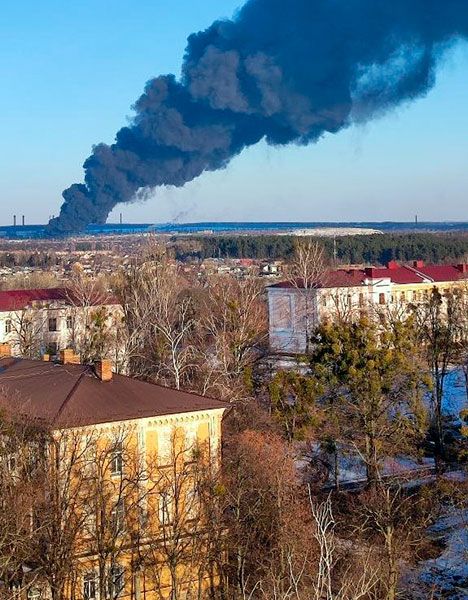Nelia Omelchenko: Growing up in war zone full of change, challenges




Nights with air raids, days with power cuts. Classes in basements, soldiers in the street.
Those were just some of the changes we felt in Ukraine, amid the sorrow and destruction of a full-scale Russian invasion that engulfed us in war.
I’m Nelia, a 16-year-old FLEX exchange student from Ukraine, who came here in August for a year-long stay arranged through ASSE International. And I’d like to describe for you how our typical day was running back home.
Mornings usually start with checking to see whether you have electricity.
Last winter, we suffered massive power cuts in Ukraine. For a certain period of time, we only had about two hours of electricity per day in my home Sumy region.
Our last power cut came in the spring, as everything has now been repaired. But the habit of making sure to turn off the light on time still persists for the majority of us.
Upon waking up, we were having to count how many hours we needed to cook, clean and study, versus things that are possible, at least theoretically, without electricity.
That kind of time management is tough. Hopefully, we won’t need to do that from now on.
Just as people all around the world learned to keep masks in every pocket during the pandemic, Ukrainians have learned to carry flashlights with them, and sometimes have extra generators at home.
Then it’s time to go to school. There’s a high possibility of meeting many defenders.
The city that I describe is Sumy. It lies in the northeastern part of the country, which shares 350 miles of border with Russia.
Sumy is not a battlefield itself, though proximity to Russia makes its outskirts prone to frequent attacks.
Badly injured soldiers and destroyed civilian buildings never fail to remind us of what is going on. But their reconstruction, through prosthetics in the one case and bricks and mortar in the other, imbue us with a strong belief that we will overcome this dark period of our history.
Classes at school are still productive. Teachers do their best to continue to instruct at a high level. But classes are punctuated by sporadic air raids.
Maks Pasko, a 16-year-old classmate of mine, has learned to predict local air raid sirens five minutes in advance.
A student of politics, statistics and analysis, he follows the pattern of air raid alerts on an online map. That way, he can see when our turn is coming.
That way, everyone has five more minutes to get down to the basement. Without any sense of fear, everyone in the school heads to the shelter.
Kids aren’t afraid of the danger posed by the missiles anymore. They just go downstairs to study, socialize or play together until it passes.
Some classes pay attention to managing stress, coping with mental issues and giving first aid to injured people.
NATO’s acronym MARCH is known now by the majority of students. It directs students to check for life-threatening conditions in an injured person in a specific order.
M stands for massive bleeding, A for airways, R for respiration, C for circulation, H for head injuries and hypothermia
Moreover, students have developed one more after-school activity. Some of them are staying after class to make camouflage net for the army under the direction of teachers.
Then it’s time to come back home, the streets are still crowded with busy people, as if it were peacetime. However, the billboards they pass now show them how to contribute to charities or help the army, and restored cafes play a warfare genre of music.
There’s no need to imagine these melodies as tragic or full of sorrow, though.
The majority of the wartime music is dynamic and positive. Its main aim is to emphasize Ukrainian military milestones and maintain the spirit of future victory throughout the society.
One of the most popular songs is “Pes Patron.” It tells of a little Jack Russell terrier named Patron, which means “cartridge” in Ukrainian.
With his light weight and keen sense of smell, this dog can detect explosives safely. One of his first assignments was locating Russian mines in the city of Chernihiv, lying in the north, which was liberated on April 2, 2022.
Owing to the hard work of this tiny dog, more than 250 mines were neutralized. Now Patron has his own bullet-proof vest, national recognition and a song commemorating his role in the war.
As you might expect, even very young kids know the lyrics. They are keen on repeating: “Who’s in charge of this region? Patron the Dog, Patron the Dog!” The song was written in Ukrainian, of course, but that’s a word-for-word translation.
Human civilians are also doing their bit.
Karina Bereznets, a 14-year-old, spends her free time selling hand-made patriotic accessories. She has been doing that for more than a year, and her contribution to the Ukrainian Army recently passed the $3,000 mark.
“I’m not supporting certain people,” she said. “We try to help everyone. I do it because I want to do my bit; I want Ukraine to live.
“We attempt to supply soldiers with whatever they need. Mostly it’s special equipment or medicine.”
Evenings still see families gather together, as in the past.
Some of the chairs may be empty, though, as some relatives may have already given their lives for the peaceful life of future generations. That helps us not to give up, to fight and to defend what we believe in.
Warm evening conversations have changed to news updates on military progress of the day.
Skill at making “trench candles” has marked my personal contribution.
A trench candle is a metal box or can filled with rolled paper and a mixture of wax and paraffin. Soldiers use them to warm up, heat their food or serve as a source of light.
They are popular with our defenders, as they can be re-lit repeatedly for a long period of time. Civilians are highly encouraged to create them, which serves as just one more thing shifting our reality.
It’s necessary for us to talk about the war, as it’s been dominating our lives for two years now. We appreciate it when nothing and nobody is forgotten.
Despite escalating sound of air raids sirens, time to sleep eventually comes.
Will the night bring drone or missile attacks? We are getting used to differentiating.
If the news channel warns about drone attacks, the biggest concern is the quantity. If the warning is about missiles, that’s not the case, as just one can wipe out your whole house.
Either way, the chain of actions is the same. You either head to the basement or go downstairs and follow the “two-walls rule.”
You need to make sure there are two reliable walls between you and outside locations. You also want to avoid windows or other sources of glass.
We spend so many nights sleeping in cold shelters and narrow corridors. Tomorrow may be a new day, but it will feature the same wartime routine.
We Ukrainians recognize and highly appreciate all the support we get around the world.
Peaceful protests, warm words of support, little blue-and-yellow accessories and stickers, donations and army supplies. It’s all noticed. It all makes a difference.
I want to convey our infinite gratitude to everyone who believes in and works for Ukrainian victory!
Guest writer Nelia Omelchenko is a 16-year-old exchange student from Sumy, Ukraine, just across the border from Russia. She arrived in Oregon in August to spend a year at Polk County’s Kings Valley Charter School. In her native land, her life has been disrupted the last two years by a full-scale Russian invasion, marked by missile and drone attacks. A budding journalist, she drew on a wartime diary she’s been keeping for this article. She likes writing articles, but this is the first one to hit print.










Comments